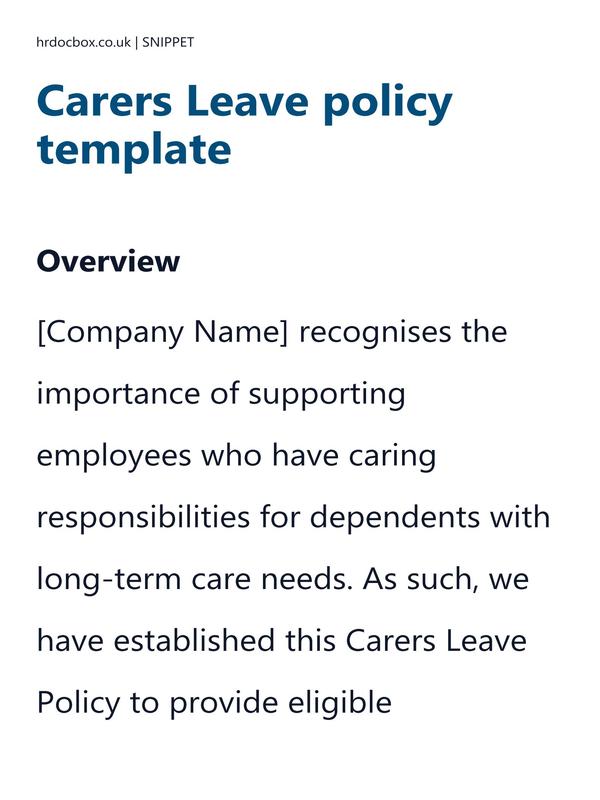Carers Leave policy template


Our Carers Leave Policy outlines entitlements and procedures, offering support and flexibility for employees balancing work and caregiving responsibilities.
- Includes Carers Leave policy template, plus 12 months’ access with all updates provided free of charge and notified to you.
- UK-specific accuracy.
- 321 words over 2 pages.
- Last updated 16/09/2025.
- Format: Word / plain text / email.
- Delivery: Instant download after purchase (no physical item).
- Access: Download link shown here after checkout.
- This Carers Leave policy template will SAVE you up to 1 hour drafting & research. Save cost. Reduce risk.
Carers Leave policy
1 Overview
1.1 [Company Name] recognises the importance of supporting employees who have caring responsibilities for dependents with long-term care needs. As such, we have established this Carers Leave Policy to provide eligible employees with the opportunity to take unpaid leave to fulfill their caring responsibilities while balancing their work commitments.
2 Scope
2.1 This policy applies to all employees of [Company Name], regardless of their length of service, who have caring responsibilities for a dependent with a long-term care need.
3 General Principles
3.1 Entitlement
Employees have the right to request one week of unpaid leave every 12 months to care for their dependent
This is a 30% preview of the Carers Leave policy template. For instant full access, purchase this item or a parent bundle.
Carers Leave policy template purpose
The Carers Leave Policy outlines the procedures and entitlements available to employees who need to take time off work to care for a dependent family member or relative. It provides clear guidance on eligibility criteria, notification requirements, and the duration of leave that employees can request for caregiving responsibilities.
This policy aims to support employees in balancing their work commitments with their caregiving duties, ensuring that they can fulfil their responsibilities without facing undue stress.
Additionally, the Carers Leave Policy demonstrates the employer's commitment to promoting work-life balance and supporting the well-being of its workforce. By offering provisions for carers leave, employers can foster a supportive and compassionate workplace culture, where employees feel valued and empowered to manage their personal and professional responsibilities effectively. This policy also helps employers comply with relevant employment laws and regulations governing carers rights, ensuring fairness and consistency in how carers leave requests are handled across the organisation.
Practical application of a Carers Leave policy template
- Issue the Carers Leave policy template during onboarding / after changes / planned refresher.
- Send it to appropriate internal recipients such as employees, workers, contractors etc. and request confirmation that is has been read and understood.
Compliance
Compliance
This Carers Leave policy template incorporates relevant UK laws and HR standards, including those listed below:
-
Employment Rights Act 1996: Provides employees with the right to take a reasonable amount of time off to care for dependents.
-
Equality Act 2010: Ensures that carers are not discriminated against based on their caring responsibilities.
-
Data Protection Act 2018 (incorporating GDPR): Mandates the handling of personal data within the carers leave policy in compliance with data protection principles.
-
Carer's Leave Act 2023: Provides additional protections and entitlements for carers, including the right to request flexible working arrangements.
-
Best Practice: Flexibility and Support: Offer flexible leave options and provide support mechanisms for employees balancing work and caring responsibilities.
Frequently Asked Questions about a Carers Leave policy template
Frequently Asked Questions about a Carers Leave policy template
-
Can I use the Carers Leave policy template in my small business?
Yes. The Carers Leave policy template is designed to be flexible and suitable for organisations of all sizes, including small businesses and charities. It follows UK employment law best practice, so even if you don't have an in-house HR team, you can confidently apply it.
-
Is the Carers Leave policy template compliant with 2026 UK employment law?
Absolutely. Like the Carers Leave policy template, all of our templates are drafted with the latest ACAS guidance and UK employment legislation in mind. We review and update them regularly, so you can be confident they remain compliant.
-
Can I customise the Carers Leave policy template for my organisation?
Yes, we highlight the areas of the Carers Leave policy template that you need to update with your own details, and where you need to make decisions to suit your situation. This saves you time and ensures that you meet best practice.
-
Do I get instant access to the Carers Leave policy template?
Yes. Once purchased, you'll be able to download the Carers Leave policy template instantly. Templates are provided in editable Word or Excel format so you can customise them easily, and in PDF format for easy sharing.
-
What if I need more help, not just a Carers Leave policy template?
If you're looking for broader support, we also offer toolkits and library bundles that include the Carers Leave policy template, along with other HR templates and policies for fully managing your situation. These may be more cost-effective if you need deeper advice.
-
Why should I use this Carers Leave policy template, and not AI to generate it?
The risk of using a free AI-generated template 'without review' includes your legal exposure, missing context, and no awareness of the wider process, whereas purchasing the Carers Leave policy template from us mitigates that risk.
